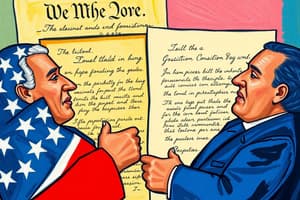Podcast
Questions and Answers
What is a potential negative impact of bureaucratic politics on US foreign policy?
What is a potential negative impact of bureaucratic politics on US foreign policy?
- Disjointed decision-making (correct)
- Increased transparency in foreign policy
- Expertise and institutional memory
- Effective communication between agencies
Which of the following is an example of a foreign policy failure attributed to bureaucratic politics?
Which of the following is an example of a foreign policy failure attributed to bureaucratic politics?
- The Iran Nuclear Deal
- The Vietnam War (correct)
- The Cuban Missile Crisis
- The Bush Doctrine
What is the primary focus of the Bush Doctrine?
What is the primary focus of the Bush Doctrine?
- International trade and economic development
- Human rights and democracy promotion
- Environmental protection and sustainability
- Nuclear proliferation and terrorism (correct)
What is a benefit of bureaucratic agencies in formulating foreign policy?
What is a benefit of bureaucratic agencies in formulating foreign policy?
What is a characteristic of the negotiations leading to the Iran Nuclear Deal?
What is a characteristic of the negotiations leading to the Iran Nuclear Deal?
What is a potential consequence of bureaucratic infighting in foreign policy decision-making?
What is a potential consequence of bureaucratic infighting in foreign policy decision-making?
What can bipartisanship in foreign policy do to enhance the effectiveness of foreign policy initiatives?
What can bipartisanship in foreign policy do to enhance the effectiveness of foreign policy initiatives?
What was a factor that drove bipartisanship in foreign policy during the Cold War era?
What was a factor that drove bipartisanship in foreign policy during the Cold War era?
What happened to bipartisanship over time in the post-9/11 wars?
What happened to bipartisanship over time in the post-9/11 wars?
What is one of the benefits of bipartisanship in foreign policy?
What is one of the benefits of bipartisanship in foreign policy?
What is an example of a time when bipartisanship was present in US foreign policy?
What is an example of a time when bipartisanship was present in US foreign policy?
What is a factor that can drive bipartisanship in foreign policy?
What is a factor that can drive bipartisanship in foreign policy?
What is the primary goal of neoliberalism in terms of government intervention?
What is the primary goal of neoliberalism in terms of government intervention?
What is the main benefit of privatization, according to neoliberalism?
What is the main benefit of privatization, according to neoliberalism?
Which of the following leaders is associated with the rise of neoliberal ideas in the 1970s and 1980s?
Which of the following leaders is associated with the rise of neoliberal ideas in the 1970s and 1980s?
What is the primary driver of economic growth, according to neoliberalism?
What is the primary driver of economic growth, according to neoliberalism?
What is the neoliberal stance on globalization?
What is the neoliberal stance on globalization?
What is the primary allocator of resources, according to neoliberalism?
What is the primary allocator of resources, according to neoliberalism?
What was the primary consequence of the deployment of large numbers of American troops to Vietnam?
What was the primary consequence of the deployment of large numbers of American troops to Vietnam?
What was the primary legal challenge in the Hamdi v. Rumsfeld case?
What was the primary legal challenge in the Hamdi v. Rumsfeld case?
What is the iron triangle?
What is the iron triangle?
What was Yaser Esam Hamdi accused of being?
What was Yaser Esam Hamdi accused of being?
What is the primary function of government agencies in the context of the iron triangle?
What is the primary function of government agencies in the context of the iron triangle?
What was the significance of the Hamdi v. Rumsfeld case?
What was the significance of the Hamdi v. Rumsfeld case?
What event triggered the U.S. military intervention in Afghanistan?
What event triggered the U.S. military intervention in Afghanistan?
Which of the following is an example of an interest group in the context of American foreign policy?
Which of the following is an example of an interest group in the context of American foreign policy?
What is the role of congressional committees or subcommittees in the iron triangle?
What is the role of congressional committees or subcommittees in the iron triangle?
Where was Yaser Esam Hamdi captured?
Where was Yaser Esam Hamdi captured?
Why do members of Congress serving on committees often develop close relationships with government agencies and interest groups?
Why do members of Congress serving on committees often develop close relationships with government agencies and interest groups?
What is the result of the iron triangle arrangement?
What is the result of the iron triangle arrangement?
Flashcards are hidden until you start studying
Study Notes
Impact on Foreign Policy
- Bureaucratic politics can lead to disjointed decision-making, causing slow or contradictory foreign policy outcomes.
- Bureaucratic agencies bring expertise and institutional memory, beneficial for effective foreign policy formulation.
- The Vietnam War exemplifies bureaucratic failure, with significant discord among the State Department, Defense Department, and CIA.
- The Iran Nuclear Deal negotiations involved multiple agencies, showcasing the complexity of coordination in foreign policy.
Bush Doctrine
- Defined as the foreign policy strategies under President George W. Bush, particularly after September 11, 2001.
- Focuses on combating international terrorism and weapons proliferation.
Historical Context of Bipartisanship
- Bipartisanship has historically emerged in American politics for addressing national security needs.
- Shared national interests and perceived external threats often drive bipartisan foreign policy efforts.
- Bipartisan initiatives enhance legitimacy and foster comprehensive policymaking by incorporating diverse perspectives.
Importance and Examples of Bipartisanship
- Demonstrates unity and resolve, bolstering U.S. diplomatic influence.
- The Cold War era reflected successful bipartisan agreement on containing Soviet communism.
- Post-9/11, there was initial bipartisan support for military action in Afghanistan, which waned over time during prolonged conflicts in Iraq and Afghanistan.
Neo-liberal Economic Order
- Neoliberalism champions free market capitalism, advocating limited government intervention, deregulation, privatization, and globalization.
- Gained prominence during the 1970s and 1980s through leaders like Margaret Thatcher and Ronald Reagan.
- Key principles include:
- Free market reliance as an efficient resource allocator.
- Minimal government interference to maximize individual freedom.
- Support for privatizing state enterprises for increased efficiency.
- Embracing globalization to enhance trade and capital flow.
Hamdi v. Rumsfeld
- A 2004 Supreme Court case addressing the detention of Yaser Esam Hamdi, an American citizen captured during Afghanistan's military actions.
- Hamdi was labeled an "enemy combatant" without legal counsel or formal charges.
- The case raised critical questions about executive authority, detainee rights, and the balance between national security and individual liberties.
Iron Triangle
- Refers to the close relationship among government agencies, interest groups, and congressional committees.
- Facilitates resource exchange, information sharing, and political support beneficial to all parties involved.
- Components include:
- Government Agencies: Bureaucratic entities like the Department of State, Defense, and CIA implementing foreign policies.
- Interest Groups: Organizations advocating for specific interests, influencing policymakers in the realm of foreign policy.
- Congressional Committees: Legislative bodies overseeing related policy areas, developing relationships with agencies and interest groups to shape policy decisions.
Studying That Suits You
Use AI to generate personalized quizzes and flashcards to suit your learning preferences.




